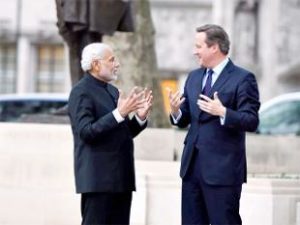
The Organisation of Economic Cooperation and Development (OECD) has supported India’s demonetisation drive, asserting that immediate impact of the move on Indian economy will be transient.
“Implementing the demonetisation has had transitory and short- term costs but should have long-term benefits,” OECD said on Tuesday in its report, Economic Survey of India. OECD Secretary-General Angel Gurria said the impact of demonetisation on consumption pattern may just have been limited to the quarter ended December 31, 2016.
The Paris-based global policy forum projected a GDP growth rate of 7 percent in the current financial year, while estimating it to grow to 7.3 percent in FY18 and 7.7 percent in FY19.
The OECD comments come a few hours before the Central Statistics Office (CSO) releases Gross Domestic Product (GDP) growth estimates for Q3FY17 and the second full year advance estimates for 2016-17. The GDP estimates released in January projected that India would grow 7.1 percent in 2016-17 from 7.9 percent in the previous year.
Amid signs of slide in consumer goods sales and muted investment activity because of the cash crunch, it is highly likely that the CSO will sharply revise downwards India’s GDP growth in its second advance estimates. Economic Affairs Secretary Shaktikanta Das, who was also present at the launch of the report, said that the benefits and outcomes of demonetisation would be positive from next quarter. “The process of remonetisation is nearly complete. Any adverse impact of consumption in that quarter is not likely to spill over next year. So that is over and behind us,” Das said.
“The shift towards a less cash economy and formalisation should, however, improve the financing of the economy and availability of loans (as a result of the shift from cash to bank deposits) and should promote tax compliance,” the report said.
On November 8, Prime Minister Narendra Modi announced that existing 500 and 1000 rupee notes would cease to be legal tender, thereby sucking out 86 percent of the currency in circulation from the economy. The survey, however, said that the temporary cash shortage and wealth destruction, as fake currency and illegal cash will not be redeemed. T
he report further said that the implementation of the goods and services tax (GST) reform will contribute to making India more integrated market. “By reducing tax cascading, it will boost competitiveness, investment and job creation.
The GST reform — designed to be initially revenue-central — should be complemented by a reform of income and property taxes,” the OECD survey said.
The survey pointed out that investment is still held back by relatively high corporate income tax rates, slow land acquisition process, weak corporate balance sheets and high non-performing loans which weigh on banks’ lending and infrastructure bottlenecks.
Key recommendations of OECD included raising revenue, especially from property and personal income taxes, ensuring that government debt to GDP ratio returns to a declining path, as well as strengthening of public bank balance sheets by recapitalising them and promoting bank consolidation.
It also suggested simpler and flexible labour laws and a gradual reduction in corporate income tax from 30% to 25%, while broadening the tax base.


